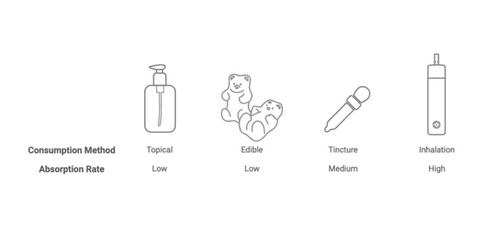The non-intoxicating cannabinoid CBD has completely taken the wellness industry by storm. In just a few short years, the cannabis-derived compound has gone from controlled substance to active ingredient in everything from dog treats to skincare products, and the market is only growing.
Unfortunately, as the industry continues to expand at exponential rates, so does the amount of misinformation surrounding CBD. With some people calling it a miracle cure for all kinds of diseases and others claiming it’s a dangerous drug, it can be hard for the average consumer to parse the truth about CBD. So let’s try to sort fact from fiction.
Preliminary research indicates that CBD may be a useful tool in treating pain, anxiety, and acne, but could it also be an effective weight loss supplement?
What Is CBD, And How Does It Work?

The cannabis plant is chock full of different therapeutic substances including aromatic terpenes and a class of compounds called cannabinoids, which includes CBD. Cannabinoids can have an array of different effects on the mind and body because they interact directly with the endocannabinoid system (ECS)—a biological system made up of neurotransmitters and neurotransmitter receptors that ensures the body maintains homeostasis.
Research into the ECS is still in its relative infancy, but we do know it plays an essential role in keeping our bodies balanced. Things like memory retention, appetite, mood, pain perception, bone modeling, metabolism, and reproductive function have all been directly linked to the endocannabinoid system.
While THC, the cannabinoid best known for its intoxicating effects, mimics the body’s natural neurotransmitters by binding directly to neurotransmitter receptors in the ECS, CBD has a more subtle process. Instead of making direct connections to cannabinoid receptors, CBD acts as a mild antagonist and influences how those receptors will interact with the neurotransmitters your body already makes.
Is CBD Good For Weight Loss?

Currently, the FDA hasn’t approved CBD as a treatment for anything besides certain seizure disorders, mainly because the legal restrictions surrounding the cannabis plant have made it difficult for researchers to conduct the necessary clinical trials. However, the preliminary research we do have into CBD looks incredibly promising and points to the compound being an effective remedy for myriad ailments, including insomnia and inflammation.
According to some studies, CBD may also help you shed some pounds as well. One study from 2018 titled, Role of Cannabinoids in Obesity, suggests that since CBD functions as an antagonist to the CB1 cannabinoid receptors, it could potentially reduce appetite. An earlier study from 2012 used animal models to reach a similar conclusion—noting that rats exposed to CBD exhibited a decrease in appetite. Other studies found that CBD can assist the body in breaking “white fat” down into healthier “brown fat” and promote a healthy metabolism.
So what can CBD do for people wanting to lose weight? While there is no definitive evidence that taking CBD can help a person lose weight, there are a number of scientific studies that indicate the cannabinoid in combination with diet and exercise could help you tighten your belt.
How To Use CBD For Weight Loss

If you’re interested in using CBD to help with weight loss, the first step is consulting your physician. CBD is non-toxic and is generally considered safe; however, it can have unintended interactions with certain medications. For that reason, it’s always a good idea to check with your doctor before beginning a therapeutic regimen of CBD.
The correct dose will vary from person to person. If you’ve never taken CBD before, it’s recommended that you start with a low dose and give it around a week to see how it affects you. If you’re not feeling much, titrate up as needed.
Also, it’s important to note that the delivery method will play a significant role in dosing. CBD has relatively low bioavailability when administered orally. This means that most of the CBD in edibles and capsules won’t actually make it into your bloodstream, so you will require a higher dose. Inhalation methods like vapes or the odin device are much more efficient at delivering cannabinoids into the bloodstream and will require smaller doses.


